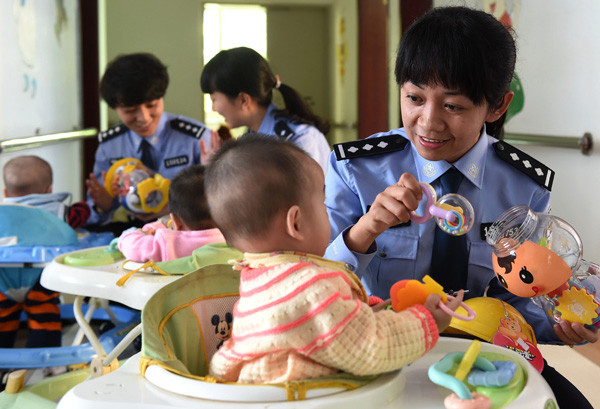 Close-up view of August Aerobatic Team
Close-up view of August Aerobatic Team
 Goddesses married in 2014
Goddesses married in 2014
 Polar region photos raise worldwide awareness of global warming
Polar region photos raise worldwide awareness of global warming
 Get off at the last stop — Beijing Subway in vision
Get off at the last stop — Beijing Subway in vision
 Top 100 beauties in the world!
Top 100 beauties in the world!
 Gallery: Who is the most beautiful one?
Gallery: Who is the most beautiful one?
 If you like autumn, put your hands in the air!
If you like autumn, put your hands in the air!
 Fan Bingbing's "Queen style" in new play
Fan Bingbing's "Queen style" in new play
 Lingerie show at 2014 Miss China
Lingerie show at 2014 Miss China
 J-10 fighters show aerobatic stunts in smog-free sky
J-10 fighters show aerobatic stunts in smog-free sky

A policewoman plays with one of the 11 babies rescued from a child trafficking ring in Yunnan province in August. The search is now on to find the children's parents. Lin Yiguang / Xinhua
Punishing purchasers
Under a proposed amendment to China's Criminal Law, which has been submitted to the National People's Congress for approval, people who buy trafficked infants will be held criminally accountable. That only happens under the present law if they actively hamper police rescue attempts, or physically abuse the children.
"When the amended Criminal Law comes into effect, it will eliminate the demand from buyers, and attack the trade in human traffic at its very roots," Wu Ming'an, a law professor at China University of Political Science and Law, said.
Li Wei, a lawyer from the Beijing Lawyers Association, said people convicted of abducting children face sentences ranging from five to 10 years. "If the circumstances are serious - such as the abduction of more than three children, causing death or serious injury, or selling children overseas - the traffickers will face sentences ranging from 10 years to death."
Chen said thousands of families have been reunited by a groundbreaking national DNA database. Ministry statistics show that since April 2009, when the database was launched, more than 1,500 youngsters have been reunited with their parents.
Chen said blood samples are taken when parents report children missing, or when the police rescue abducted children. The information is immediately entered on the national DNA database.
"The system can quickly compare DNA samples from the parents and children and can be accessed by the police nationally," he said.
Facing obstacles
According to Chen, his officers face practical difficulties when working on cases of children who have been missing for a long time.
"After many years, a child may have been trafficked many times, and their appearance, voice, or individual information may have changed completely, so it's difficult to collect valuable clues to identify them."
He said the police will attach greater importance to visiting villages in key areas, such as Yunnan, Guangxi, Guangdong, and Fujian, and will also improve collection methods for blood samples.
Dai Peng, director of the criminal investigation college at the People's Public Security University of China, said: "The priority must be to impose harsher punishments on the purchasers, and improve the legal and moral education of local residents, especially those in key trafficking areas, such as Yunnan and Guangdong."
He also suggested the public security service should deepen cooperation with the relevant government departments, including welfare institutes and the department of education, to improve social management in coping with child abduction.
 |
Day|Week|Month